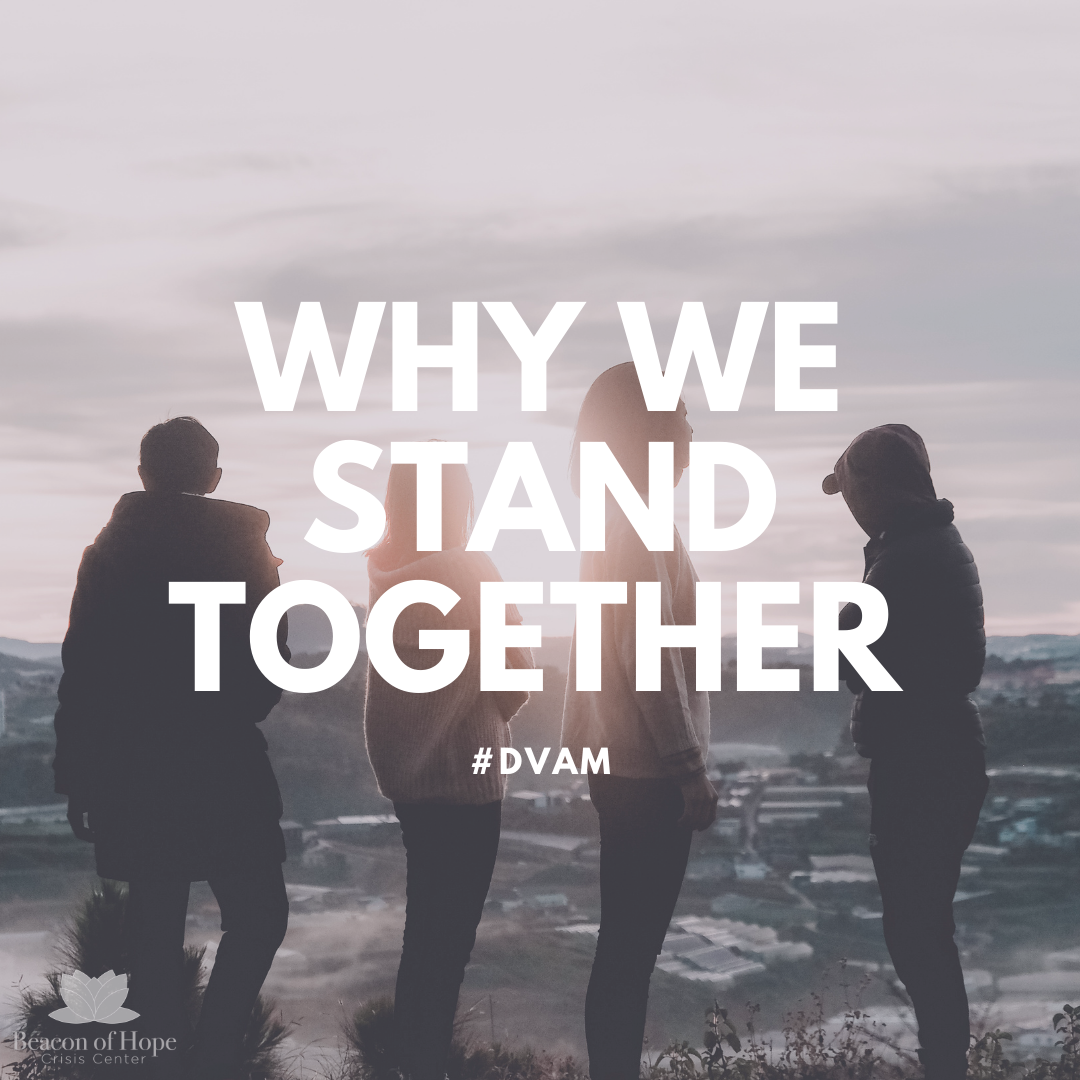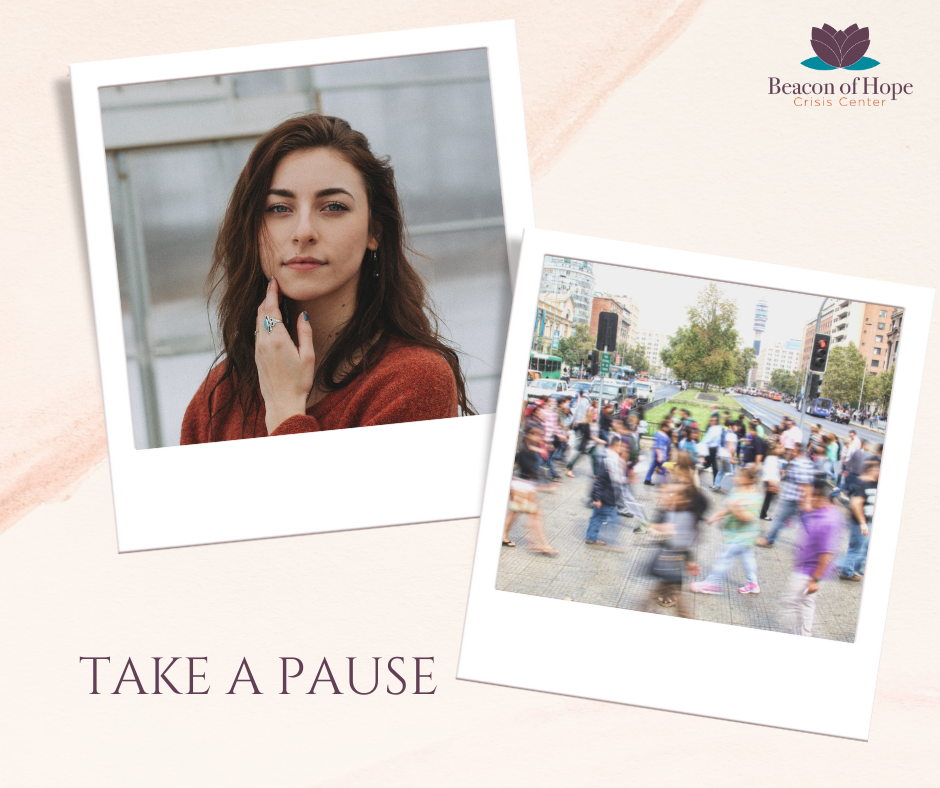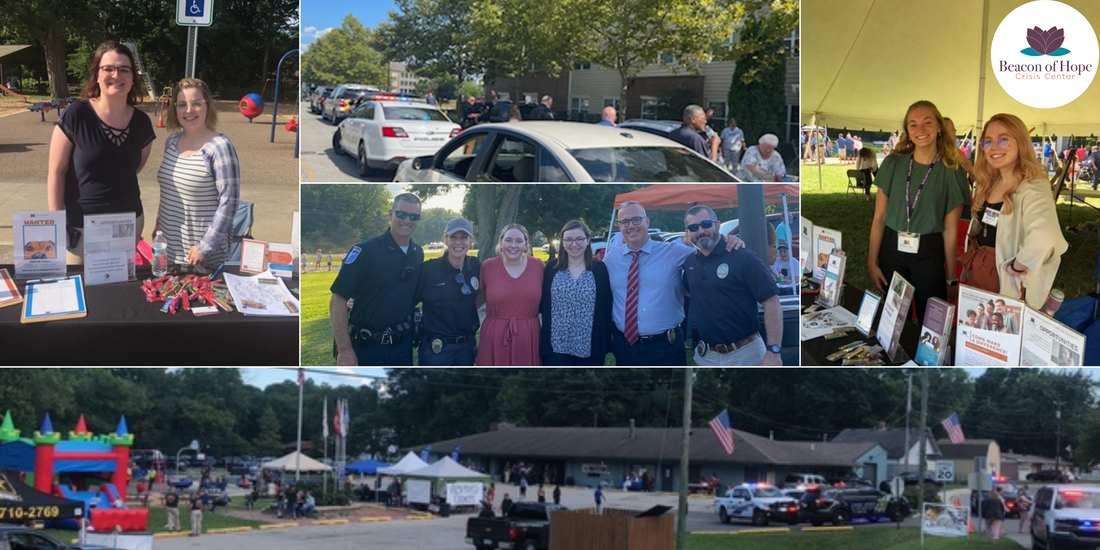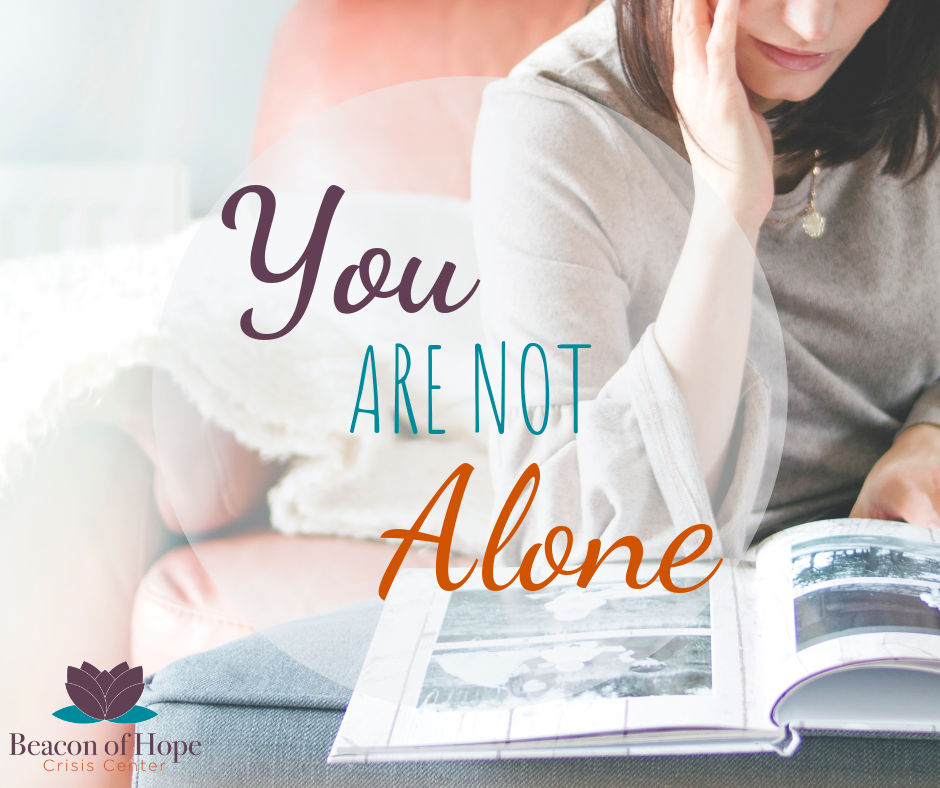|
By: Kaylee Kriese If you’ve been on social media lately, we are hopeful that you have seen plenty of posts about Domestic Violence Awareness Month. Perhaps you’ve been acquainted with domestic violence before. Many people have. In general, if you or a loved one haven’t experienced abuse in a relationship, you know someone who has.
There’s a reason you see #WeStandTogether on our social media so often. For us, it’s more than a hashtag. It continues to exceed beyond a trend or another social media bandwagon to hop onto. For survivors, abuse is incredibly isolating. It leaves them feeling separated from their loved ones and spiraling in guilt, fear, and self-hatred. One of the most common tactics of abusers is to perpetuate the “us vs. them” fallacy, and for a while, it may feel to the victims that their abusers are the only person they have for companionship. Even so, we know that in toxic relationships, this feeling never lasts. Victims of abuse are somehow always the ones left feeling powerless, wanting, and alone. When our advocates champion #WeStandTogether, it is because we never want survivors to feel alone. Our goal is that from this point on, you will forever know that you have a team offering support without judgement. With the dedication of the entire month to domestic violence awareness, we hope that this is especially apparent, not just from our advocates but from other nonprofits, groups, or individuals out there who stand with survivors. Today, on Purple Thursday, we wear purple, a color of peace, courage, survival, and honor, as one unified front.[1] We post because we know that only when we stand together can we all work to help survivors break free from the grip of domestic violence. With the help of our community, we will continue to save lives. Thank you to everyone who stands as an ally to survivors. [1]https://mmcenter.org/stay-informed/domestic-violence-awareness-month#:~:text=The%20color%20purple%20is%20a,end%20the%20cycle%20of%20violence. By: Savannah Tipton Survivors are facing increased risks due to the pandemic and needs are on the rise. We need financial contributions now more than ever. According to the Substance Abuse and Mental Health Services Administration, “COVID-19 has caused major economic devastation, disconnected many from community resources and support systems, and created widespread uncertainty and panic. Such conditions may stimulate violence in families where it didn’t exist before and worsen situations in homes where mistreatment and violence has been a problem.” We are seeing more people face financial hardships, housing insecurity, and challenges with their mental health. Victim Advocates connect survivors and their families to life-saving services in a variety of ways. Every day, advocates are working with victims on safety planning, protective order filing, victim rights education, housing searches, employment readiness, and so much more. Anyone can be impacted by domestic violence or sexual assault. It’s important we show survivors that they are not alone in their journey to healing and self-sufficiency. Whether a trauma occurred in the last week or years ago, survivors reach out to us for help finding resources and support. We also must acknowledge that COVID-19 has left many victims trapped in homes with their abusers. “And as the pandemic has dragged on, so too has the abuse. Just as the disease continues to claim more lives, quarantine-linked domestic violence is claiming more victims—and not just women in heterosexual relationships. Intimate partner violence occurs in same-sex couples at rates equal to or even higher than the rates in opposite sex partners (1).” Limited interactions with the outside world can make victims feel trapped in a vicious cycle of abuse. Free resources and confidential support are available. We want victims to know there is a safe way out. Victims of sexual assault are also at a heightened risk. According to RAINN, 8 out of 10 rapes are committed by someone known to the victim (2). This means sexual assault victims might be forced to see their rapist regularly. That alone might make them fearful of reporting the crime or seeking help. Victim Advocates are available to listen, offer support, and answer questions. They can also provide victims accompaniment to hospitals, courts, and law enforcement interviews. If you have ever considered giving, now is the time to act. Survivors need the community to come together. Your donations provide victims with essential items when they flee, emergency transportation to shelter, help relocating or maintaining safe housing after abuse, and other emergency needs. Your donation will have positive impact on people in your community. Speak with a victim advocate by calling our confidential crisis line at (317) 731-6140. You can also reach us through social media messaging or our contact us page. If you are in immediate danger, please call 9-1-1. By: Savannah Tipton We all know someone who has experienced domestic violence, but we may not know who that is in our lives. Survivors walk among us and are often people we are close with including friends, family, and coworkers. It’s difficult to accept this reality but essential to raise awareness that anyone can be impacted by domestic violence. According to the National Coalition Against Domestic Violence, “1 in 3 women and 1 in 4 men have experienced some form of physical violence by an intimate partner.” However, domestic violence is not limited to physical abuse. Other types of abuse include emotional, psychological, spiritual, financial, sexual, and digital. Domestic violence happens daily, and survivors often feel silenced and alone. We want all survivors to know that free and confidential resources are available.
We can all act as an ally to survivors by educating ourselves about domestic violence warning signs and red flags. If you identify warning signs or red flags of domestic violence in your network or your own life, reach out to a local domestic violence agency to discuss next steps and the resources available to you. Talking about domestic violence saves lives. It’s important that we speak up when something does not feel right. Warning Signs of Domestic Violence
Perpetrators of domestic violence are often likable and charismatic. There is no single description for all abusers. They are not always lurking in the shadows or threatening to the outside world as movies might portray. Many abusers get along well socially at work and in their personal lives. Their behavior typically shifts behind closed doors when they are alone with the victim. Most abusers are only violent with their current or past intimate partners (1). They are also extremely manipulative. This includes minimizing the seriousness of the violence, blaming others for their abusive behavior, and breaking down the victim’s self-confidence. Abusers can threaten a victim directly and indirectly including threats of homicide and suicide. Threats and acts of violence are used to take control over the victim. Threats are often made towards friends, family members, children, and pets. A victim might stay in a dangerous situation out of fear for themselves or those they love. “Abusers repeatedly go to extremes to prevent the victim from leaving. In fact, leaving an abuser is the most dangerous time for a victim of domestic violence (2).” Red flags of an Abuser (1)
At Beacon of Hope Crisis Center, we are committed to breaking the cycle while empowering victims and survivors to take back their life. From providing emotional support to safety planning, let us be your advocate. For more information, contact our Confidential Crisis Line: (317) 731-6140. If you are in a life-threatening situation, call 9-1-1 immediately. SOURCE: By: Savannah Tipton This year's National Night Out events were a success, with lots of fun activities, experiences, and great company! It was great to see everyone relax and have fun. There was a variety of information and organizations present at each location. Some of the highlights included delicious food, snow cones, bounce houses, mini ponies, face paintings, caricatures, and so much more! Thank you to our law enforcement partners for organizing these wonderful opportunities for agencies, law enforcement, firefighters, and the community to come together.
It was lovely to see everyone present and enjoy each other's company on a beautiful summer day. We want to thank all officers for showing up to participate and creating new connections. We are so grateful that we had the opportunity to share information about our agency, our services, and show our support for our law enforcement partners. We had a fantastic time at National Night Out and cannot wait to attend again next year. -Beacon of Hope Crisis Center Team By: Savannah Tipton Society has typically associated feelings of grief to the death of a loved on. We can understand that someone may have difficulty processing the death despite the circumstance (illness, accidents, etc.). When we expand the definition of grief to include other things that are lost, society gives less acknowledgement or validation. Survivors of domestic violence may experience grief over lost self-esteem, loss of their home and the life they knew, or even the future they once planned for. They may experience this grief during and after the relationship has ended. There are many reasons survivors do not disclose abuse (humiliation, fear, guilt, shame) and this can further complicate feelings of grief. Survivors need access to support as they start their healing journey. Some may find support from friends and family while others turn to professionals.
To better understand the connection between grief and domestic violence, we must first look to all that a survivor of domestic violence may lose or leave behind after being victimized (see below). Together we can become more educated and give survivors validation to grieve or mourn all that they have lost. Advocates are available to validate feelings of grief and connect clients to supportive services and free counseling. Confidential Crisis Line: (317) 731-6140 Losses Which Are Grieved
By: Marty Burtt Beacon of Hope Crisis Center’s Foster Pet Program is a unique service that we are proud to be able to offer to our clients. Family pets offer a sense of stability, comfort, and unconditional love that creates a special bond between a family and their pet. In homes with domestic violence and/or sexual assault, the family pet is at a high risk of being abused and/or neglected. Over 71% of battered women reported that their batterers had harmed, killed, or threatened animals to coerce, control, and humiliate them*. Additionally, numerous surveys have reported that 25% to 40% of battered women report they delayed their decision to seek safety out of fear for their animals’ welfare**. Our Foster Pet Program helps protect pets in homes where violence is happening by placing them in a temporary, safe home until it is safe for them to be back with their family.
Our Foster Pet Program gives victims peace of mind in knowing that their pet/s is safe. Our Foster Pet Program Coordinator (FPPC) gets weekly updates from the foster family on the pet/s and how the pet/s is doing and then provides that update to the victim. The FPPC is in consistent communication with everyone involved with the pet/s. We are always excited when victims have secured a safe home and can safely be reunited with their pet/s. This program is available to any victim of domestic violence and/or sexual assault that is fleeing their abuser, as well as victims that are receiving services from other agencies. Beacon of Hope Crisis Center has recently launched the Central Indiana Pet Abuse Link Task Force to help keep Indiana pets safe. The Pet Abuse Link Task Force is comprised of individuals within the community that share our passion for keeping pets safe. Learn more about our Foster Pet Program here. *Ascione, Weber & Wood, 1997 **McIntosh, 2002 By: Shelby Bubnick Children who have witnessed domestic violence may experience significant long-term effects. According to the Childhood Domestic Violence Association, 40 million adult Americans grew up living with domestic violence. Witnessing domestic violence can have a lasting impact on their lives and alter their hopes for the future.
Children who grow up in homes with domestic violence are three times more likely to repeat the cycle in adulthood as a victim in an abusive relationships or by becoming abusers themselves. * This can happen because violence becomes a norm in the eyes of the child and feel that they are at fault. 30% to 60% of perpetrators of intimate partner violence also abuse children in the household. ** Studies support the findings that rates of abuse are higher among those who were abused as children or who witnessed abuse as children. ** These children can also be at higher risk for health problems when they become adults. These can be psychological, such as depression and anxiety. While others may experience problems with their physical health such as diabetes, obesity, heart disease, and more. Many studies show that stress and trauma can impair children’s brain development. Adults who experienced significant early life stress have differences in brain structure compared to people who experienced low levels of early stress. * Early exposure to violence can influence an infant’s stress reactivity. This can have lifelong effects on psychological and physical health. Domestic violence can even affect a child before they are born as domestic violence often begins or grows more intense during pregnancy. This results in maternal stress, which can interfere with fetal brain development. * Long-term effects of witnessing domestic violence as a child:
*cdv.org **domesticshelters.org By: Shelby Bubnick Children are often the silent victims of domestic violence. 1 in 15 children are exposed to intimate partner violence each year, and 90% of these children are eyewitnesses to the violence. * Although children can be resilient, many who witness or overhear abuse – whether the abuse is emotional, verbal, or physical, are at high risk for profound short-term psychological, mental and social effects.
Domestic violence in the home can create a tense environment. As a result, children who live in these homes might experience fear and anxiety. Younger children who witness abuse may start to regress to toddler behavior (thumb sucking, bed-wetting, increased whining and crying). School-aged children may blame themselves for the abuse. This self-blame reaction can occur naturally, or because the abuser told the child that they are responsible for the violence. Either way, this can hurt a child’s self-esteem. Low self-esteem can affect the child’s participation in classes and school activities which may isolate them. Teenagers who witness abuse may experience different short-term effects than young children. Teens might respond to this violence by acting out in negative ways such as, fighting with family members and skipping school. Teens are also more likely to abuse drugs and alcohol to cope with the stress and anxieties of their home life. These teens may experience low self-esteem and have trouble making friends. In some cases, these effects can ultimately cause depression. It is essential to recognize the short-term effects of witnessing domestic violence to help the child recover. Witnessing abuse is traumatizing, and it may be something the child never forgets. Connect with community resources; educate yourself and your kids. The sooner a child gets help, the better their chances of becoming a healthy adult. If a child has witnessed domestic violence:
To speak with an advocate and learn more about services at Beacon of Hope Crisis Center please call our crisis line (317) 731-6140. We are here to help. *ncadv.org By Savannah Tipton Raising domestic violence awareness can be as unique as each survivor’s story. In a music video, Denise Latray performs an original song that shares her own story of domestic violence. She has reached thousands with her video and her efforts have not gone unnoticed. Denise uses music to tell her own story as a coping mechanism. In her own words, “I've used a music video to somewhat paint a picture for my viewers.” If she could share one thing with survivors it would be as follows: “to stay encouraged, remain strong and continue to be a voice for the victims experiencing abuse.” We are stronger when we stand together. Beacon of Hope Crisis Center stands by all survivors of domestic violence and sexual assault. Providing assistance to everyone that may be affected by domestic violence and sexual assault is one way we have committed to make a change in our community. Thank you for sharing your story Denise. Disclaimer: Beacon of Hope Crisis Center assumes no responsibility, liability and no role in the information gathering practices or privacy policies of video content to which this video is linked. Beacon of Hope Crisis Center does not endorse or otherwise guarantee any materials linked to this video or video ad’s associated with this video. Beacon of Hope Crisis Center is not endorsing or promoting this video or any contents within it. We are simply sharing a survivor’s message about their personal story.
By Sandra K. Ziebold October is Domestic Violence Awareness Month
There is a knot of fear that goes along with having experienced being a victim of a frequent, consistent and systematic pattern of domestic violence abuse. Domestic violence is about power and control. Abuse occurs when there is consistent unwanted dominance and control exerted over another. You may be in an intimate partner relationship and thinking to yourself, "What happened, I felt so wonderful and now I feel this horrible ache that won't leave the pit of my stomach. How did I get here and why do I feel so trapped? What can I do better? If I can do things better then he/she will, be okay / be calm / be happy." If you have thoughts like that, then stop for a second and really think about your thought pattern. Can you remember the last time you didn't have that aching knot of fear in your stomach? If you are constantly fearful that your every single breath or action is going to trigger anger and violence in another person exerting control over you, then our advocates can help you. It is domestic violence awareness month and you need to know that you are valued, there is a safe way to get out of your situation and you deserve a life free from the grip of domestic violence. We are here to help. Our crisis line number is (317)731-6140 |
About this blog
This blog is about our domestic and sexual violence crisis center, Beacon of Hope. We hope you find it full of helpful information, motivation, creativity, serious facts and positivity. We hope that it will help you know what is happening in our center, in our community and with our events. We hope you follow our blog in support of our organization and our mission. Archives
October 2024
Categories
All
|
|
CAREER opportunities © 2024 Beacon of Hope Crisis Center Privacy Policy Accessibility Statement Training Portal Login |












 RSS Feed
RSS Feed